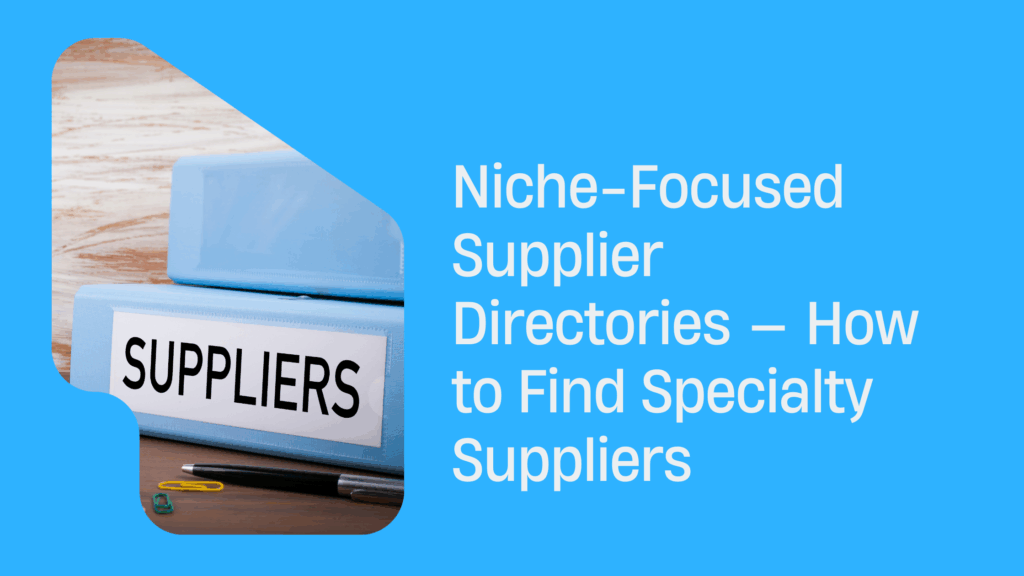Niche-Focused Supplier Directories — How to Find Specialty Suppliers
Niche dropshipping suppliers play a critical role in ecommerce by offering products that support differentiation and brand positioning. Unlike general suppliers, they focus on specialized categories that appeal to defined consumer segments.
Eco-friendly, handmade, and tech-focused suppliers require targeted sourcing because they often follow stricter quality, compliance, or innovation standards. For example, an eco dropshipper directory helps identify sustainable vendors, while handmade dropship suppliers emphasize authenticity and craftsmanship.
This blog outlines structured methods to discover and evaluate such suppliers, with attention to specialized directories, associations, and tools that simplify sourcing across eco, handmade, and technology-driven product niches.
Why Niche Suppliers Matter for Retail Growth
Niche suppliers enable retailers to differentiate in crowded markets. Their focus on eco, artisanal, and tech categories helps businesses meet rising consumer expectations for unique, sustainable, and high-quality products.
Key Considerations
Market Demand for Differentiated Products
- Growing consumer preference for eco-friendly products, handmade goods, and innovative tech items.
- Niche dropshipping suppliers often align with ethical consumption trends, appealing to sustainability-driven buyers.
- Eco dropshipper directory resources showcase certified suppliers that meet environmental standards.
Higher Margins and Stronger Branding Opportunities
- Specialty products reduce price competition, enabling premium pricing strategies.
- Handmade dropship suppliers allow brands to market authenticity and exclusivity.
- Technology-focused suppliers offer innovative products that support value-driven positioning in electronics and gadget niches.
Risks of Generic Suppliers
- Limited product differentiation, leading to commoditization and margin erosion.
- Dependence on generic supply chains increases vulnerability to price wars.
- Lack of unique branding opportunities weakens long-term brand equity.
Customer Loyalty and Retention Benefits
- Shoppers attracted by sustainability, authenticity, or innovation are more likely to become repeat buyers.
- Niche product assortments reinforce brand identity and customer trust.
Scalability Considerations
- Specialty suppliers often invest in compliance, certifications, and product quality controls that support long-term partnerships.
- Directories help businesses identify partners capable of scaling without sacrificing product integrity.
Alignment with Regulatory and Ethical Standards
- Eco-focused suppliers provide certifications like organic, FSC, or Fair Trade.
- Artisan networks ensure transparent labor practices and verified origins.
Methods for Discovering Niche Suppliers
Identifying niche dropshipping suppliers requires structured sourcing methods. Retailers must rely on curated directories, industry events, associations, and digital marketplaces to ensure credibility, quality, and alignment with specific niche categories.
Supplier Directories
Supplier directories provide structured access to verified vendors. Niche directories narrow the focus to eco, handmade, or tech-specific suppliers, enabling retailers to filter based on specialization, compliance, and technical readiness.
Overview of General vs Niche Directories
General directories list broad categories of suppliers, while niche directories target specific segments such as sustainability or handmade crafts. The latter provides more accurate matches for retailers seeking differentiated products.
Eco Dropshipper Directory
Eco directories prioritize suppliers with sustainability certifications and environmental compliance. They help retailers source products aligned with consumer demand for responsible, eco-friendly goods and reduce the risk of greenwashing.
Handmade Dropship Suppliers
These directories connect retailers with artisan communities, ensuring authenticity in craftsmanship. Handmade dropship suppliers are often vetted for originality, small-batch production capacity, and adherence to fair labor standards.
Tech-Focused Directories
Technology directories specialize in electronics and related products. They often include safety certifications, warranty details, and compliance documentation, which are essential for maintaining quality assurance in consumer electronics categories.
Trade Fairs and Expos
Trade fairs and expos remain essential for discovering niche dropshipping suppliers. These industry events provide structured opportunities to assess eco, handmade, and tech suppliers through direct interaction and verified sourcing channels.
How Industry Events Connect Retailers with Specialty Suppliers
Industry events create direct access to niche dropshipping suppliers by gathering verified vendors in one place. Retailers can identify eco-certified manufacturers, handmade dropship suppliers, or tech innovators without relying solely on digital directories.
This environment reduces the risk of unverified sourcing by offering physical interaction and supplier demonstrations. Exhibitors often provide detailed product documentation, compliance certifications, and integration readiness data, allowing retailers to validate supplier claims on the spot. Such face-to-face engagement strengthens trust and accelerates supplier shortlisting.
Benefits
- Credibility checks – Trade fairs and niche directories allow businesses to verify the legitimacy of niche dropshipping suppliers. When using an eco dropshipper directory or searching handmade dropship suppliers, credibility can be confirmed through certifications, membership records, and third-party audits. This reduces the risks of unreliable partners.
- Physical product validation – Direct interaction provides an opportunity to examine product quality, sustainability claims, and craftsmanship standards. For eco-focused or handmade products, physical validation ensures authenticity and compliance with environmental or labor standards. This helps businesses align with consumer expectations for transparency and quality.
- Real-time negotiation – Meeting suppliers in person or through structured directory platforms allows immediate discussion of terms, pricing, and logistics. Businesses gain flexibility to secure favorable agreements, clarify customization options, and establish expectations quickly. This accelerates supplier onboarding and reduces communication gaps common in online-only interactions.
Industry Associations and Groups
Specialized industry associations and groups act as structured gateways to niche dropshipping suppliers. They provide credibility, vetted access, and curated resources across eco, handmade, and technology-driven supply chains.
Role of Membership-Based Organizations in Providing Vetted Supplier Access
Membership-based organizations reduce sourcing risks by pre-vetting suppliers based on defined standards. They maintain strict eligibility requirements, conduct periodic audits, and verify certifications.
This ensures only credible suppliers are accessible through their networks. For businesses, partnering with such associations enhances trust, simplifies supplier discovery, and reduces the due diligence burden.
Whether accessing an eco dropshipper directory, networks of handmade dropship suppliers, or tech vendor groups, associations act as intermediaries ensuring compliance, sustainability, and quality benchmarks are consistently met across supplier partnerships.
Examples
- Eco-certification bodies – Organizations such as FSC, Fairtrade, or organic certification councils validate sustainable sourcing. Their directories often feature eco dropshipper directory listings, enabling businesses to identify suppliers committed to environmental standards.
- Artisan cooperatives – Handmade dropship suppliers often work within cooperatives that regulate quality, ensure fair labor practices, and authenticate origin. Membership offers buyers access to genuine, small-batch products with verified ethical sourcing.
- Tech councils and alliances – Industry groups like electronics trade councils or IoT alliances list technology-driven suppliers. These organizations assess compliance with safety standards, scalability, and integration readiness, ensuring suppliers align with digital-first retail operations.
- Cross-category access – Many associations partner with directories, extending reach to niche dropshipping suppliers across eco-friendly, handmade, and advanced technology categories. This structured access simplifies supplier evaluation and reduces operational risks for retailers.
Online Marketplaces with Niche Segmentation
Specialized online marketplaces simplify the search for niche dropshipping suppliers by categorizing eco-friendly, handmade, and technology-focused products, allowing businesses to quickly identify partners aligned with their sourcing requirements.
Using B2B Marketplaces
- B2B platforms often host curated lists of suppliers segmented by niche categories.
- Eco-focused platforms connect retailers to sustainable manufacturers and can complement an eco dropshipper directory.
- Artisan platforms highlight handmade dropship suppliers, ensuring authenticity and craftsmanship.
- Technology-focused marketplaces provide structured access to electronics, components, and emerging tech goods.
- These platforms often include search tools that allow businesses to filter by location, production capacity, and shipping capabilities.
- Integration with ecommerce systems is increasingly common, enabling smoother onboarding of niche suppliers.
- Many marketplaces provide performance ratings, helping to assess supplier reliability before commitment.
Filters and Certifications as Verification Criteria
- Marketplaces that specialize in niche dropshipping suppliers often provide certification filters.
- Eco suppliers may display certifications like FSC, Fair Trade, or organic compliance.
- Handmade suppliers can be verified through cooperative memberships or authenticity seals.
- Tech suppliers may include CE, FCC, or ISO certifications as baseline requirements.
- Filtering by certifications ensures regulatory alignment and credibility.
- Updated certification data helps mitigate risks associated with unverified or non-compliant suppliers.
- Advanced filters can also narrow down by lead times, inventory integration (APIs), or shipping regions.
- Relying on verified criteria strengthens due diligence and improves supplier vetting efficiency.
Evaluating Niche Supplier Directories
Specialized directories must be assessed for reliability, accuracy, and technical depth. Strong evaluation ensures that niche dropshipping suppliers, whether in eco, handmade, or tech markets, meet compliance, scalability, and automation standards.
Verification Standards
Verification ensures suppliers are legitimate and credible. Directories that highlight certifications, licenses, and audit records give retailers confidence when sourcing from eco dropshipper directory resources or handmade dropship suppliers.
Assessing Supplier Legitimacy
- Look for certifications such as organic, Fair Trade, or FSC for eco-friendly suppliers.
- Confirm artisan cooperatives or handmade dropship suppliers carry proper trade registrations.
- Third-party audits add credibility by validating quality control and ethical practices.
Cross-Checking Against Regulatory Requirements
- Align supplier credentials with government or international trade regulations.
- Ensure compliance with labor, safety, and environmental standards in local and cross-border markets.
- Prevent risk of penalties or reputational damage through regulatory mismatches.
Data Accuracy and Updates
Accurate, updated data in directories is critical for reliable supplier discovery. Outdated or inactive entries create risks when sourcing from the eco dropshipper directory listings or niche dropshipping suppliers.
Importance of Regularly Updated Supplier Directories
- Updates reflect active suppliers with current contact details and inventory.
- Provides accurate product categories for handmade dropship suppliers or eco-friendly partners.
- Enhances trust by reducing wasted communication efforts.
Risks of Outdated Listings and Inactive Suppliers
- Leads to delays in supplier response or order fulfillment.
- Damages brand credibility with customers if products are unavailable.
- Wastes resources evaluating suppliers no longer in operation.
Integration and Technical Capabilities
Technical compatibility is vital for scaling. Directories highlighting suppliers with automation support—APIs, EDI, or real-time feeds—help retailers integrate niche dropshipping suppliers into efficient, automated workflows.
Supplier Readiness for Automation
- APIs enable seamless product, pricing, and stock updates.
- EDI ensures structured data exchange for order and invoice accuracy.
- Real-time inventory feeds reduce overselling and backorders.
Value of Directories Listing Technical Compatibility as a Filter
- Retailers can shortlist eco dropshipper directory entries supporting automation.
- Saves evaluation time by pre-identifying suppliers with robust digital infrastructure.
- Ensures compatibility with multichannel platforms, reducing future integration costs.
Criteria for Selecting Specialty Suppliers
Specialty suppliers must be evaluated against strict standards of quality, compliance, and scalability. Structured assessment ensures reliability and strengthens long-term partnerships with niche dropshipping suppliers across eco, handmade, and tech categories.
Product Quality and Differentiation
Product quality and uniqueness define the success of niche sourcing. Retailers must verify eco credentials, artisanal authenticity, or technological innovation to ensure products meet customer expectations and support brand differentiation.
Detailed Pointers
- Eco credentials:
- Review certification details provided in the eco dropshipper directory listings.
- Verify sustainability claims with third-party audits or environmental standards.
- Prioritize suppliers using renewable or recyclable materials.
- Artisanal authenticity:
- Confirm that handmade dropship suppliers maintain traditional methods or certified artisan practices.
- Check origin verification documentation and fair labor assurances.
- Look for product descriptions emphasizing craftsmanship, not mass production.
- Tech innovation:
- Assess supplier’s investment in R&D and product updates.
- Verify compatibility with recognized technology standards.
- Compare product specifications against market benchmarks.
Compliance and Sustainability Standards
Compliance builds trust and ensures products align with regulatory and ethical requirements. Retailers must validate certifications for eco, handmade, and tech suppliers to prevent risk and maintain customer confidence.
Eco Suppliers
- Require certifications such as FSC, Fair Trade, or organic.
- Confirm alignment with international environmental regulations.
- Verify supplier’s carbon footprint or sustainability reporting.
Handmade Suppliers
- Validate compliance with local and global labor laws.
- Request documentation proving fair wages and ethical sourcing.
- Ensure origin verification is traceable and transparent.
Tech Suppliers
- Check for CE, FCC, or RoHS safety certifications.
- Verify compliance with electronic waste and recycling regulations.
- Assess data security and warranty policies.
Scalability and Fulfillment Reliability
Scalability determines whether suppliers can handle growth without compromising service. Retailers must evaluate order capacity, seasonal readiness, and fulfillment reliability when sourcing from niche dropshipping suppliers.
Detailed Pointers
- Order volumes
- Request supplier’s maximum order capacity.
- Validate performance data during peak cycles.
- Confirm flexibility for sudden demand surges.
- Seasonal peaks
- Assess ability to expand production during holidays.
- Evaluate history of on-time fulfillment during peak seasons.
- Prioritize suppliers with diversified production capacity.
- Fulfillment timelines
- Review average lead times from supplier records.
- Ensure integration with real-time tracking systems.
- Cross-check delivery SLA compliance over six months.
Building Long-Term Supplier Relationships
Strong supplier relationships are critical for sustainable ecommerce growth. With niche dropshipping suppliers—whether sourced from an eco dropshipper directory or handmade dropship suppliers—structured processes, transparent agreements, and ongoing evaluation ensure alignment and scalability over time.
Importance of Structured Onboarding for Niche Dropshipping Suppliers
- Develop standardized onboarding workflows tailored to niche suppliers, ensuring clarity on roles, communication channels, and fulfillment expectations.
- Provide clear documentation on product data formats, order processing protocols, and integration requirements to minimize delays.
- For eco dropshipper directory partners, verify certifications and sustainability claims at the start to avoid compliance risks.
- For handmade dropship suppliers, validate authenticity and supply capacity to safeguard product consistency.
- Train suppliers on system integrations (APIs, dashboards) to streamline inventory synchronization and order accuracy.
- Establish SLAs covering lead times, packaging standards, and dispute resolution to formalize accountability.
- Use phased onboarding—starting with smaller test orders—before scaling volumes to reduce risk.
Negotiating Branding, Exclusivity, and Private-Label Opportunities
- Clarify branding rights early, including packaging, labeling, and marketing material usage.
- With niche dropshipping suppliers, negotiate terms that allow customization of brand identity without compromising supplier compliance.
- Explore exclusivity agreements, particularly for eco-friendly or handmade products, to secure differentiation in competitive markets.
- Use private-label terms to strengthen brand recognition, ensuring suppliers can support customized designs and consistent quality.
- Validate whether suppliers from eco dropshipper directory listings can scale private-label production within agreed standards.
- Assess handmade dropship suppliers for their ability to maintain craftsmanship under private-label requirements.
- Ensure all agreements include enforceable terms on confidentiality, quality control, and supply continuity.
Continuous Evaluation Through Performance Metrics
- Define key performance indicators (KPIs) for niche dropshipping suppliers, including delivery rates, defect rates, and communication responsiveness.
- Track delivery performance to measure fulfillment reliability and minimize customer dissatisfaction.
- Monitor defect rates closely for eco-friendly and handmade suppliers to ensure authenticity and compliance with product standards.
- Evaluate communication quality, response times, and accuracy in handling queries or exceptions.
- Benchmark suppliers against industry averages or peers listed in eco dropshipper directories.
- Use real-time dashboards to monitor ongoing performance and identify patterns.
- Conduct quarterly reviews to assess supplier alignment with growth goals and adapt terms if needed.
Conclusion
Directories play a central role in helping retailers identify and connect with niche dropshipping suppliers. Whether sourcing from an eco dropshipper directory, handmade dropship suppliers listings, or technology-focused networks, structured evaluation ensures alignment with quality, reliability, and growth goals.
Clear onboarding, negotiated branding opportunities, and continuous performance tracking safeguard supplier partnerships. By leveraging niche-specific channels strategically, businesses strengthen differentiation, build sustainable operations, and unlock long-term ecommerce growth.
Success depends not only on finding suppliers but also on managing them with disciplined processes, ensuring brand control, higher margins, and consistent customer experiences in competitive online markets.
FAQs
Where do I find niche dropship suppliers?
Search niche directories, eco dropshipper databases, handmade dropship suppliers listings, and industry associations; complement with B2B platforms offering curated niche supplier categories.
How do I verify quality for handmade items?
Request production samples, review defect history, assess material sourcing transparency, and verify certifications; enforce performance KPIs covering durability, finish consistency, and compliance.
Which trade shows to explore for niche suppliers?
Attend category-specific expos like eco-product fairs, artisan markets, and technology trade shows; prioritize events endorsed by recognized trade bodies for verified niche supplier participation.



